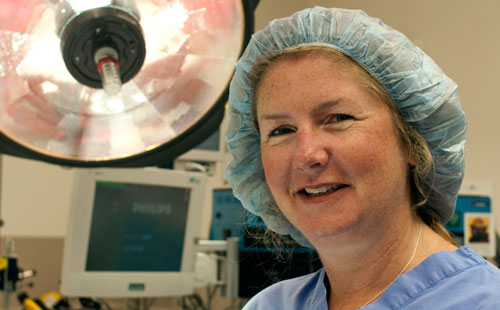Value improvement teams study cost and consequence


Like most consumers, Helen McCullough, D.O., compares prices and product performance when shopping for things like groceries or cars. But it wasn’t until recently that Dr. McCullough, Christiana Care medical director for Gynecologic Surgery, learned the price tags on various instruments and procedures in the operating room, as part of her work with the Gynecologic Surgery Value Improvement Team. The team has a dynamic initiative focused on establishing the optimum balance between top-notch care and cost-efficient treatment for hysterectomy patients.
“Our charge was to look at our services and pick them apart,” says Linda Daniel, director of performance improvement/care management for the Women’s and Children service line at Christiana Care. “Are they cost effective? Are they evidence-based, will they improve patient outcomes?”
In a presentation at a recent meeting of the President’s Cabinet of Christiana Care CEO Robert J. Laskowski, M.D., Dr. McCullough illustrated how the choices that doctors make impact the cost of health care. In one hand, she held a reusable Masterson clamp and suture. The cost: $10-$15. In the other hand, she held a disposable stapler that allows the doctor to place absorbable sutures. The cost: $600 for a single use.
“We found that there was no significant difference in outcome,” Dr. McCullough says. “If that disposable stapler doesn’t need to be opened, Christiana Care just saved $600.”
Surgeons are highly trained in procedures and techniques. But most are not educated on costs of specific instruments and materials.
Department Chair Richard Derman, M.D., notes that all of health care will be challenged to use resources wisely without compromising the safety or quality of care for our patients. Determining value is a complex dance that balances costs to the health care system, as well as the impact on patients and society as a whole.
“Unfortunately, given the unprecedented levels of spending in health care, we do not regularly evaluate the benefits of the care we deliver in terms of both quality and cost,” says Sharon Anderson, senior vice president for Quality and Patient Safety.
Adds Gretchen Makai, M.D., director of Minimally Invasive Surgery, “This is a clinician-led project. It’s not to cut corners; it’s to make certain that patients get the best care.”
Sometimes, using a more expensive instrument makes sense. Dr. Makai points to the harmonic scalpel, a $400 disposable tool used in laparoscopic hysterectomy that simultaneously cuts and efficiently coagulates tissue. “The patient has less pain, can leave the hospital earlier and get back to her life with her family and her job in much less time,” she says. “When you look at the benefits to the patient, the health care system and the community, it is money well spent.”
Dr. Makai and Dr. McCullough say their heightened cost-consciousness has resulted in a simple change in procedure in the operating room that eliminates the waste caused by discarding unused disposable instruments.
“The first thing we say to our scrub techs is ‘don’t unwrap anything unless we need it,’” Dr. McCullough says. “We want to raise awareness among surgeons that there are costs involved in everything we do.”
Value Symposium to help connect the dots
Dr. McCullough and Dr. Makai will share what they have learned with Christiana Care colleagues in an upcoming Value Symposium. The symposium will focus on value in the operating room for all surgeons, as well as issues associated with uterine artery embolization, use of robotics, potential pitfalls on the use of surgical mesh and the rise of ambulatory hysterectomy. Dr. Makai and Dr. McCullough are hopeful the Value Symposium will be a springboard for raising awareness throughout the surgical community.
“We would like all divisions of surgeons to be aware of what we will be discussing and to recognize the opportunity to see how their behaviors and choices impact the bottom line,” Dr. McCullough says. “The surgeons, nurses and scrub techs will take away a new level of consciousness about value and product costs.”